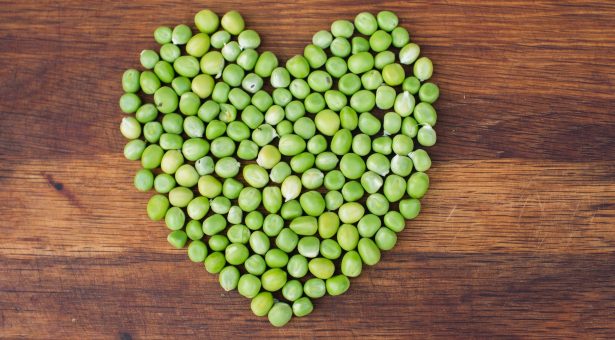Cancer fighting pea proteins

Colorectal cancer has become one of the leading causes of cancer-related deaths worldwide.
Because colorectal cancer is closely linked to diet, the disease is significantly increasing in the western world, tackling the incidence of this disease has become a research and public health priority.
There is a huge research focus on examining the beneficial effects of certain compounds in food. Among those being studied, are a class of protease enzyme inhibitors called Bowman-Birk Inhibitors (BBIs), which can be found in many legumes such as pea, soybean and lentil.
Combating cancer
Protease enzymes have long been recognised as major players in many different biological processes, including cell signalling, digestion, and immune responses.
More recently, interest has expanded to investigate their role in human diseases, ranging from cancer to inflammatory disorders.
It is known that abnormal and dysregulated protease activities can play a role in tumour formation and progression. Research suggests that plant protease inhibitors such as Bowman-Birk Inhibitors could help control this activity.
It’s been proposed that the large amounts of soybeans consumed within traditional Japanese diets may be a factor for the low rates of cancer mortality in the Japanese population. This is potentially due to the abundance of protease inhibitors in the beans.
Bowman-Birk Inhibitors are known to be very stable; they can travel through the digestive system to the large intestine without major degradation and remain intact against the metabolic activities of the intestinal microbiota.
As such, there has been a strong interest in investigating the anti-carcinogenic properties of Bowman-Birk Inhibitors on tumours within the colon.
In the 1990s, Bowman-Birk Inhibitors acquired the status of an ‘investigational new drug’ by the US Food and Drug Administration (FDA).
Studies focusing on Bowman-Birk Inhibitors derived from soybean have found that they are capable of suppressing cancer and inflammatory disorders in a variety of animal systems (mice, hamsters and rats).
Our scientists worked in collaboration with the Institute of Food Research (now Quadram Institute) to investigate the anti-carcinogenic properties of Bowman-Birk Inhibitors in pea seeds.
In 2005, an investigation looking at the ability of Bowman-Birk Inhibitors to influence the growth of human colon cancer cells in the laboratory revealed that the pea seed Bowman-Birk Inhibitors could be at least as significant as those derived from soybean in the fight against cancer.
In 2012, Professor Claire Domoney worked in collaboration with scientists in Spain to compare the effect of a naturally-occurring Bowman-Birk Inhibitors from peas and an inactive mutant form of Bowman-Birk Inhibitors on the growth of colon cancer cells.
The naturally-occurring Bowman-Birk Inhibitor had a dose-dependent inhibitory effect on the tumour cells, whilst the inactive mutant did not show any effect. Thus proving that the proliferation of the cells is reduced through protease inhibition. This highlighted the striking positive impact that the protease inhibitory activity of Bowman-Birk Inhibitors can have.
Alfonso Clemente, who began his research on Bowman-Birk Inhibitors at the John Innes Centre as a Marie Curie fellow, has continued research on the potential of cancer fighting Bowman-Birk Inhibitors, and the underlying mode of action, at the Spanish National Research Council (CSIC).
Although the molecular mechanism and therapeutic targets of Bowman-Birk Inhibitors remain unknown, the reported data support a role for Bowman-Birk Inhibitors from legumes, including pea, in the fight against cancer.
Further reading
- Clemente, A., Gee, J.M., Johnson, I.T., MacKenzie, D.A., Domoney, C. (2005). Pea (Pisum sativum L.) protease inhibitors from the Bowman-Birk class influence the growth of human colorectal adenocarcinoma HT29 cells in vitro. Journal of Agricultural and Food Chemistry, 53, 8979-8986. DOI: 10.1021/jf051528w
- Clemente, A., Moreno, F.J., Marín‐Manzano, M.D.C., Jiménez, E., Domoney, C. (2010). The cytotoxic effect of Bowman–Birk isoinhibitors, IBB1 and IBBD2, from soybean (Glycine max) on HT29 human colorectal cancer cells is related to their intrinsic ability to inhibit serine proteases. Molecular Nutrition & Food Research, 54, 396-405. DOI: 10.1002/mnfr.200900122
- Clemente, A., Marín-Manzano, M.C., Jiménez, E., Arques, M.C., Domoney, C. (2012). The anti-proliferative effect of TI1B, a major Bowman–Birk isoinhibitor from pea (Pisum sativum L.), on HT29 colon cancer cells is mediated through protease inhibition. British Journal of Nutrition, 108, 135-144. DOI: 10.1017/S000711451200075X
